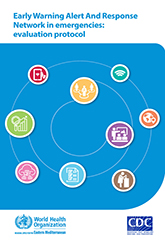Early warning alert and response network in emergencies: evaluation protocol
 Early warning alert and response network in emergencies: evaluation protocol
Early warning alert and response network in emergencies: evaluation protocol
Humanitarian emergencies often increase the risk of transmission of communicable diseases, resulting in increased morbidity and mortality, particularly from outbreak-prone diseases. To address this increased risk, WHO and its partners established the Early Warning Alert and Response Network (EWARN), a simplified disease surveillance and response system that focuses on early detection of and rapid response to outbreaks or unusual health events. This evaluation protocol has been developed to provide guidance and standardized methods to ministries of health to evaluate EWARN implemented in countries of WHO's Eastern Mediterranean Region.
How to obtain measures of population-level sodium intake in 24-hour urine samples
 How to obtain measures of population-level sodium intake in 24-hour urine samples
How to obtain measures of population-level sodium intake in 24-hour urine samples
There is compelling evidence of the direct relationship between salt consumption and blood pressure. WHO is coordinating initiatives globally to reduce dietary salt intake at the population level. Fundamental to this initiative is for countries to estimate a baseline of population-level dietary salt intake, and from there, to monitor trends in intake and the effectiveness of any interventions within and between populations. This document provides an essential salt intake measurement tool for countries in the Eastern Mediterranean Region that want to start, contribute to and share information on dietary salt reduction initiatives.
Framework for action for health workforce development in the Eastern Mediterranean Region 2017–2030
 Framework for action for health workforce development in the Eastern Mediterranean Region 2017–2030
Framework for action for health workforce development in the Eastern Mediterranean Region 2017–2030
The Framework for action for health workforce development in the Eastern Mediterranean Region has been developed in response to the health workforce challenges facing the Region and in recognition of the need for countries, in line with Sustainable Development Goal target 3.C to increase the recruitment, development, training and retention of the health workforce. The framework, which builds on the Global strategy on human resources for health: Workforce 2030, aims to guide country and regional action to strengthen the health workforce to ensure access for all people to an adequate, competent, well balanced, motivated and responsive health workforce which contributes to health systems strengthening and progress towards universal health coverage in the Region.
Index Medicus for the Eastern Mediterranean Region
Index Medicus for the Eastern Mediterranean Region
For indexing, abstracting, archiving and sharing regional health knowledge, including citations from more than 645 peer-reviewed journals published in 20 countries
IMEMR Journals Directory
IMEMR Journals Directory
Bibliographic repository for information on health and biomedical sciences journals published in the Region and indexed in the Index Medicus
Institutional Digital Repository
Institutional Digital Repository
Comprehensive digital memory for all information products produced by the Regional Office
Arabic MeSH
Arabic MeSH
For indexing, organizing and retrieving information and information products in Arabic
Medical library directory
Medical library directory
Facilitates the flow of information between libraries in the Region and coordinates regional and global efforts to improve access to health information
HINARI
HINARI
Access to one of the world's largest collections of biomedical and health literature for developing countries
Research4life
Research4life
Access to academic and professional peer-reviewed online content for developing countries
Global Health Library (Global Index Medicus)
Global Health Library (Global Index Medicus)
International platform to promote and link mainstream, regional, national and local health information
Visit the library
WHO staff and visitors to the Regional Office are encouraged to visit the library and access a range of print materials and electronic resources available at the resource desk.